Disappointing German Inflation Rate Figures Lead to EUR/USD Exchange Rate Losses
The Euro (EUR) has fallen against the US Dollar (USD) today, trading at a level of $1.6858.
This decline comes after the release of German inflation rate figures for August, which showed estimates for minimal growth for the monthly reading.
The preliminary readings printed as forecast, but this meant no change from 2% for the annual reading and a shift from 0.3% to 0.1% for the monthly figure.
A lack of German inflation rate acceleration has unsettled Euro traders today, as it lowers the chances of an early 2019 European Central Bank (ECB) interest rate hike.
US Dollar to Euro (USD/EUR) Exchange Rate Rises by 0.4% on Income and Spending Growth
The US Dollar (USD) has firmed and risen by 0.5% against the Euro (EUR) today, following the news that US income and spending levels grew in July.
Personal income growth slowed compared to June but remained positive, while reported spending levels hit 0.4%.
While not especially impressive on paper, these figures have still been well-received by economists and US Dollar traders.
In the former case, Capital Economics US Economist Andrew Hunter responded by saying:
‘The data suggest that much of the strength of consumption growth in the second quarter has carried over into the third.
‘[Annual] real consumption is on track for a gain of between 3% and 3.5% in the third quarter, and we expect that overall GDP will expand at a similar rate too.’
Yesterday brought estimates for 4.2% US GDP growth in Q2 2018, so the Capital Economics forecast has added to USD trader optimism today.
Euro to US Dollar Exchange Rate Forecast: Will Lower Eurozone Unemployment Push EUR/USD Up?
The Euro (EUR) could recover and rise against the US Dollar (USD) on Friday, when high-impact Eurozone inflation and unemployment rate data comes out.
Current expectations are for the Eurozone inflation rate to remain above the European Central Bank (ECB) target range of around 2%.
Such news could cause the Euro to rise against the US Dollar, as it would mean that the ECB faces more pressure to raise interest rates early in 2019.
A rate hike from the ECB next year has been pencilled in for months, but economists are still unsure about exactly when the long-awaited rate hike could arrive.
Demand for the Euro could also increase when the Eurozone’s unemployment rate reading for July comes out – this is tipped to reduce from 8.3% to 8.2%.
Friday afternoon will close weekly data releases with US University of Michigan confidence stats.
Consumer confidence levels in August are expected to have fallen from 97.9 points to 95.5; this result could lower USD demand and enable Euro gains into the weekend.



